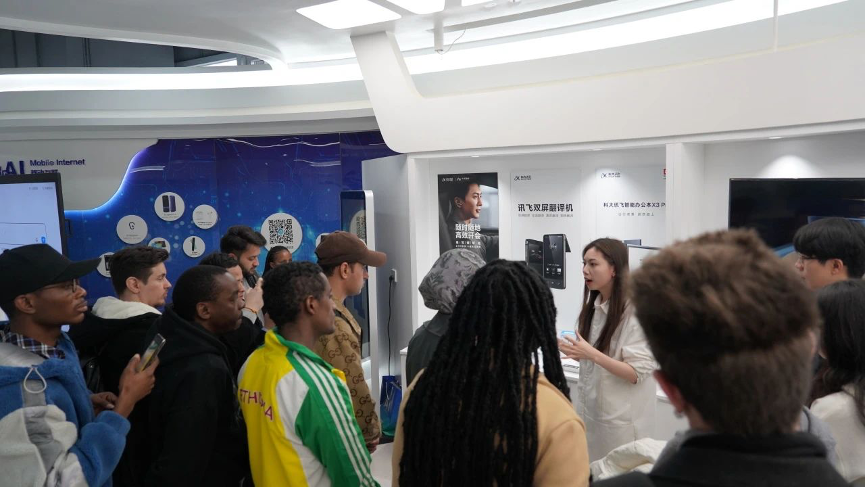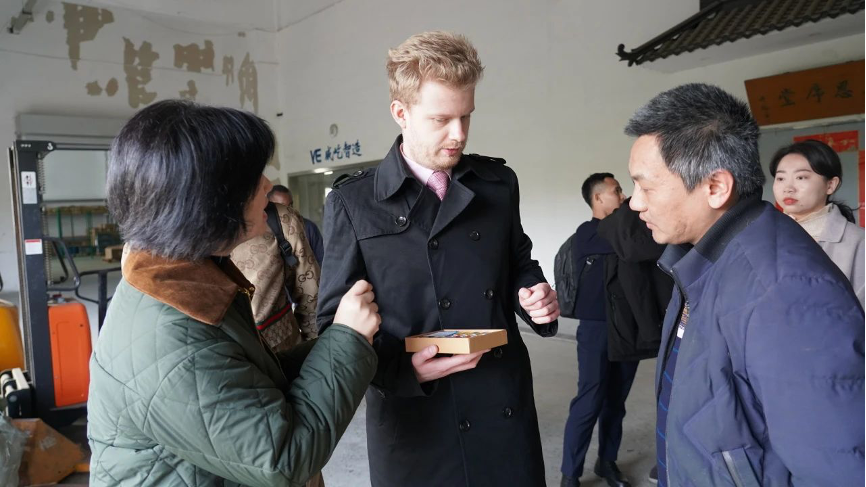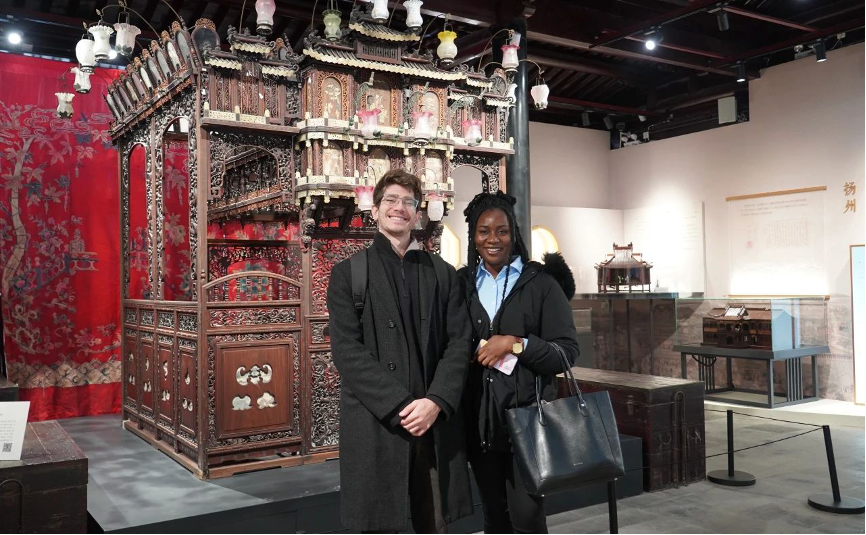Foreign students of the Silk Road School at Renmin University of China (RUC) shared their insights on hot topics such as artificial intelligence (AI) and the inheritance and innovation of traditional culture with the convening of China’s Two Sessions.
“AI Development as an Opportunity for a Shared Future”
At the iFlytek Suzhou Research Center, international students experienced AI products such as the iFlytek Spark platform, Multilingual Simultaneous Interpreting System, and robotic AI applications. These immersive experiences showcased China’s rapid AI advancements and open-source innovation ecosystem.

Conor, a student from the United States, emphasized AI’s crucial role in fostering cross-cultural communication. “AI voice technology helps break language barriers, enabling communication between speakers of different languages and even preserving endangered dialects,” he said.
He hoped that AI could integrate more functions to expand its impact rather than remain focused on specific scenarios. Conor also supported DeepSeek’s open-source approach, highlighting that AI collaboration across nations could unite countries and foster global consensus in an increasingly complex international landscape.

“A Perfect Balance Between Modernization and Cultural Heritage”
Jiang Sixu Tang, a century-old Suzhou-based company, has produced traditional Chinese painting pigments from minerals and plants. To adapt to market demands, the company launched an e-commerce platform in 2010, expanding its market both domestically and internationally. By 2023, its annual sales reached 16 million yuan, with major clients including the Palace Museum in Beijing, the National Palace Museum in Taipei, and the Metropolitan Museum of Art in New York.
Ali from Pakistan admired how China seamlessly balances modernization with cultural preservation. “It’s incredible how China continues to produce pigments using traditional materials while experiencing rapid economic growth. This is something other countries should learn from,” he said.
Alexander from Bangladesh was also impressed by China’s cultural innovation. He praised China’s government for investing in cultural heritage protection and supporting cultural industries. He was particularly fascinated by Suzhou Industrial Park’s integration of business, tourism, and ecological preservation, recognizing its significance in enriching residents’ cultural and spiritual lives.

“Cultural Innovation Promotes Exchange, Dialogue, and Economic Growth”
Kunqu Opera, one of Suzhou’s seven UNESCO-recognized Intangible Cultural Heritage elements, is often called the “ancestor of Chinese opera.” The youth-adapted version of The Peony Pavilion has modernized the traditional art form while retaining its essence, drawing millions of viewers over 20 years and inspiring young audiences to appreciate Kunqu.
Pedro from Brazil praised such innovative adaptations, stating, “Performances like the youth version of The Peony Pavilion make it easier for young people and foreigners to understand Chinese culture. Theater reflects the cultural core of a nation.” He suggested exchanges based on playwrights like Tang Xianzu and William Shakespeare could foster inter-civilization dialogue and strengthen international relations.
Jane from Ghana shared her first exposure to Chinese theater through a Confucius Institute event in Ghana, where local and Chinese performers collaborated. She also recounted a friend’s enriching experience at a Chinese university winter camp, which deepened her appreciation for China’s language, culture, and lifestyle.
Pedro and Jane agreed that cultural heritage fosters global dialogue and economic prosperity. “Cultural tourism directly benefits the economy,” Pedro noted. Jane added, “Cultural products sell particularly well during festivals, boosting both economic growth and heritage preservation.”
As a vital force in promoting a shared future for humanity, international students in China serve as cultural bridges and active participants in the country's technological and cultural innovation. The Silk Road School at RUC has long been committed to helping international students deeply experience, understand, and share China’s developments.
With the convening of China’s Two Sessions, students have shown keen interest in key topics such as artificial intelligence (AI) and the inheritance and innovation of traditional culture. To enhance their understanding, the Silk Road School organized a series of research and study activities, allowing them to explore AI’s open-source collaboration and traditional culture’s innovative transmission.
From AI’s open-source cooperation to the innovation of traditional culture, China is embracing the world with an open mind while providing a model for integrating technology and culture. AI advancements support the vision of a shared future for humanity, while cultural innovation serves as a bridge for inter-civilization dialogue.

As international students have observed, progress in both technology and culture not only drives national development but also forms the foundation for global prosperity. Moving forward, deeper international cooperation in AI and culture will create new possibilities, fostering a more inclusive and harmonious world. The Silk Road School will continue to play a key role in nurturing cultural ambassadors who bridge China and the world.



